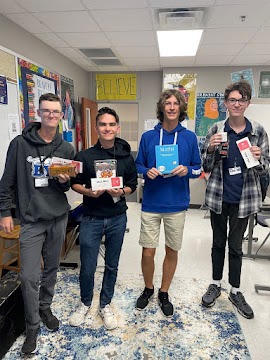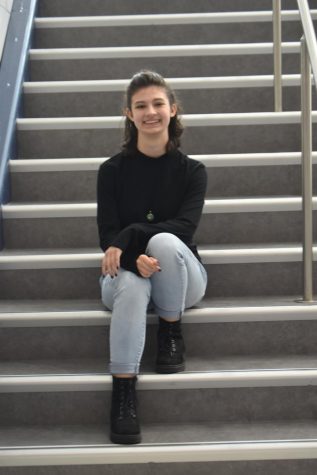Quizzical questing
Calculus classes participate in school-wide puzzle competition
December 12, 2022
When some people think about math classes—particularly Calculus classes—they often picture stuffy, old classrooms, teachers who look like they lived through the Civil War and thick, heavy textbooks filled with unintelligible gibberish. What they don’t often picture is groups of students racing around the school, competing to win a series of increasingly difficult puzzles and claim prizes for finishing The Quest.
However, Mr. Joe Hill, the AP Calculus teacher, decided that that was exactly what his students needed.
“I wanted to create something memorable and novel, something that my students had never done in their 12 years of school,” Mr. Hill said. “When all the derivative and integral rules are forgotten, The Quest would be remembered by my former students.”
His idea for this complex adventure spawned from two places: first, his love of the book Ready Player One, and second, a scavenger hunt one of his neighbors hosted during the beginning of the shutdown for the entire neighborhood.
“I wasn’t quite sure what form this would take,” Mr. Hill said. “Would it be an escape room in my own classroom, an after-school event or a multi-week quest? So I blended these two ideas to make my own quest.”
Indeed, he immediately caught his students’ attention by including an increasingly bizarre number of subtle hints and clues. He posted a short, horror movie-esque trailer near the end of September before dropping a riddle and a limerick in Google Classroom in the first half of October. This culminated with the inclusion of the dictionary entry for the word ‘quest’ on a test at the end of October.
“At the beginning of the hints and allusions that something was coming, there was a fairly universal sense of confusion among the calculus classes as the cryptic hints slowly petered in, first with a random teaser trailer, essentially, then the quest appearing a couple of times and other small clues, all the while Mr. Hill denied that anything was happening at all,” senior participant Connor Nance said. “At least for me, all the buildup constantly nagged at me making me want to know what exactly was coming.”
All these breadcrumbs finally culminated with several students spotting a conspicuously hung paper on Mr. Hill’s whiteboard. On it, scrambled letters spelling out the words “The Quest” were accompanied by a QR code, which led students to their first clue.
“I had been contemplating this idea last school year,” Mr. Hill said. “I had all summer to plan, so why not go big with the first ever Quest, right? I knew the students I would have this year, and I knew they would absolutely love something like this. You know that feeling you get when you find the perfect gift for someone and you can’t wait to give it to them because you know how much joy and excitement they will have? That’s what I felt as I was designing this for my students.”
Over the course of The Quest, the riddles brought teams all over the school, from the 800 hall to the 200 hall to the cafeteria. It also included several other teachers that the majority of the calculus class had previously had.
“There were times I was sprinting across the school to beat another team to the next clue, running into my old teachers’ classrooms and multiple moments where I just had to stop in the hallway as I noticed a clue hidden in plain sight,” senior Bella Cloud said. “What really made The Quest so special though was that it brought something really fun to school.”
Mr. Hill chose to include these blasts from the past for his senior students as a way for them to relive some of their favorite parts of the past four years of high school. The students ultimately ended up visiting English I and II and Humanities I and II teacher Mrs. Amy May, AP US History teacher Mr. Matt Highfill, Advanced and AP Chemistry teacher Mr. Vito Peri, and Fundamentals of Education teacher and Diversity Club sponsor Mrs. Jill Hill, who also happens to be Mr. Hill’s wife.
“As I developed The Quest over the summer, I realized that I had puzzles related to chemistry, history, and English,” Mr. Hill said. “This formed the idea that I needed The Quest to be something that had my students going all over the school, and naturally, they should visit past and current teachers.”
It also included clues that spanned many different styles and played to many different strengths, which forced students to work together with their teams to problem solve.
“My favorite part was experiencing The Quest with my students,” Mr. Hill said. “Seeing them struggle with different clues and puzzles and then ultimately figure them out was so much fun!”
All in all, it combined calculus skills, logical reasoning and some plain old detective work to solve all the riddles and puzzles. This resulted in a greater sense of teamwork and bonding within teams.
“One of my biggest strategies was to work with my team,” senior Luke Orr said. “From the start, we made a group chat and that chat didn’t stop having constant messages until it ended. It was a great experience that helped me get closer with my friends while solving fun puzzles along the way.”
Mr. Hill also began each day of class by posting the leaderboard of The Quest, which caused students to see where they were in comparison to other teams and increased the competitive environment.
“My overall favorite part of The Quest would definitely have to be the end,” Nance said. “Our team had been stumped for a couple of days or so and a lot of the teams had mostly stagnated with us at the top of the leaderboard and we didn’t seem to have too much to worry about. Then, Mr. Hill put up the leaderboard on the Smartboard in class and we had been passed and were now in second place. When I saw it, I immediately panicked (there had been hints that it was very close to the end of The Quest) and texted the rest of the team (who were all in the other calculus class) essentially saying ‘Code Red, we’re in second place and if we want to win we’ve got to get this clue done ASAP and finish this thing.’”
With this new revelation, the two top teams, who had been neck-and-neck since the beginning, all began to work as fast as they could to finish first.
“My group and another group were both on the final clue and we were on opposite sides of the room racing to complete it before the other,” Orr said. “It created a dramatic photo finish that I’ll never forget.”
However, pride and bragging rights were not the only thing on the line. A few days into The Quest, a treasure chest mysteriously appeared at the front of Mr. Hill’s classroom.
“What surprised me most was how fast my students went through The Quest,” Mr. Hill said. “I should have known that when you take some of the brightest students in the school and give them a competition, they will be hyper-fixated on winning! Plus, they saw a treasure chest in my room filled with prizes to win.”
Mr. Hill also admitted to his surprise at the focus and dedication of his students to The Quest and how determined they all were at being the first to finish.
“I initially thought this would take four to six weeks to complete,” Mr. Hill said. “Within the first week, I had two teams who were nearly through the entire quest! Unbeknownst to them, I added two clues at the end just to make sure The Quest lasted longer than a week.”
However, The Quest also helped students to foster new skills that are not just applicable to math, but ones that can help them throughout life.
“As the puzzles got more difficult and the overall pace of the competition slowed, we took more time simply because we had to take more time to solve each puzzle and we met and talked it out as a group and really tried to look from every angle we could think of and find any new way the riddles could be interpreted to give us a new lead,” Nance said. “Sometimes we just had to take some time to think about it and the answer would just come to mind or otherwise present itself.”
It also helped students to go above and beyond what they would normally do for class, pushing them to their limits.
“Some of the puzzles were even downright educational too, leading me to learn a new math formula before we did it in class or forcing me to look at the big picture rather than the details I tend to focus on,” Cloud said.
Ultimately The Quest brought students together and allowed for a break from the monotony of the school year in a fun, new, invigorating way.
“I think that The Quest helped me gain a greater sort of sense of urgency about school, given that Senior-itis had been knocking on the door at the time,” Nance said. “I would like to make sure Mr. Hill receives his due credit for spending tons of time and effort to coordinate and make The Quest possible and for simply being one of the best teachers anyone could possibly have. If anyone is on the fence about taking Calculus, do it; Mr. Hill makes it way, way easier than it could be and he does not want the class to be the bane of your existence.”
Looking forward, Mr. Hill hopes that this is simply the first in a long line of future Calculus Quests.
“I wanted to create an excitement for what students in Calculus get to do as a way to encourage other students to take the class,” Mr. Hill said. “Assuming I can keep creating more quests, then this could become a tradition. There are some things I need to do to improve the experience, and the challenge will be to come up with more puzzles. But that’s what summers are for, right?”



